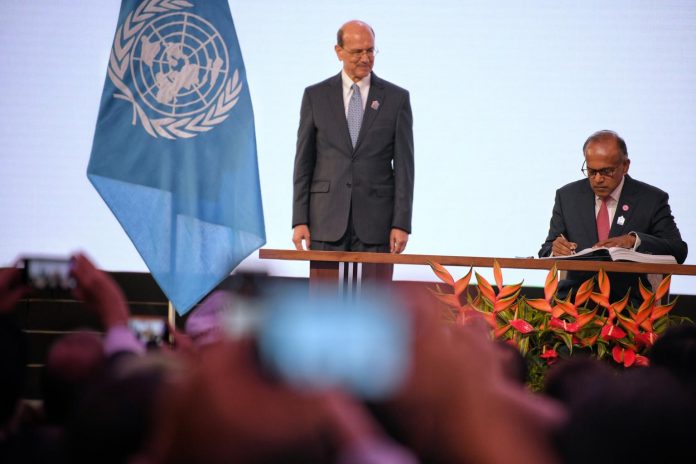This article is written by Kushang, a student from Himachal Pradesh National Law University (HPNLU). This article talks about the Singapore Convention on Mediation. It describes important provisions, issues, and challenges related to the Convention. The article also briefs about why the Convention is being seen as a potential game-changer in commercial dispute settlement.
Table of Contents
Introduction
“An ounce of mediation is worth a pound of arbitration and a ton of litigation.” Such is the impact of mediation. Mediation is an alternate dispute redressal method wherein parties settle their dispute or differences through mutually selected impartial and neutral persons. The person aims for a win-win situation for both the parties. The Singapore Convention on Mediation is a step toward making mediation a common mechanism to solve disputes among parties. Mediation was always seen with many benefits like less costs involved, more confidentiality of the matter, and less time-consuming method to settle disputes. However, there was not much importance given to it in the international commercial dispute process. The Convention came into force on 12th September 2020 and aims to make mediation a common practice among the international trade players.
What is the Singapore Convention on Mediation
The United Nations Convention on International Settlement Agreements resulting from mediation, more commonly known as the Singapore Convention on Mediation was adopted in December 2018. In 2019, 46 countries including the USA, China, and India signed the Convention in Singapore. Currently, there are 53 signatories to the Convention. It applies to mediation in matters related to the international settlement agreement. The Convention is being seen as a very effective way of solving trade disputes through mediation. It will provide a legal framework within which a settlement agreement resulting from the mediation of international trade dispute may be enforced. Basically it aims to make mediation as a reliable and enforceable form of dispute settlement. The Convention aims to facilitate international trade and settlement of disputes arising out of it. The Convention came into force from 12 September 2020.
Key provisions of the Convention
The Convention has certain important provisions that would facilitate the dispute settlement in international trade. Some of them are-
- The Convention does not apply to all types of settlement due to mediation. Article 1 of the Convention limits the scope by providing that only international settlement agreement arising out of mediation to settle a commercial dispute is covered under the Singapore Convention on mediation. Also the settlement concluded should be in written form by the parties. Thus, a settlement arising out of mediation relating to family, or household purpose, or employment law is not covered under the Convention.
- The obligation of the parties to the Convention with regard to enforcement of settlement and also the right to invoke a settlement agreement covered by the Convention is mentioned in Article 3.
- Certain formalities have to be fulfilled by parties in order to get relief on a settlement agreement. This has been mentioned under Article 4 of the Convention. It mentions that the settlement agreement must be signed by the parties and that there should be evidence that the settlement agreement resulted due to mediation.
- There are certain grounds on which the court may refuse to grant any relief at the request of the party against whom it is invoked. Article 5 states these grounds which can be broadly categorised under 3 heads namely disputing parties, the settlement agreement and mediation procedure.
- The Convention also gives option to parties involved in such settlement to expressly opt out of the Convention by stating the term in settlement agreement against any form of relief. This is mentioned in Article 5(1)(d).
- A special provision of the Convention is that the signatory states have the ability to make reservations under Article 8 of the Convention that the Convention will apply only to the extent that parties to the settlement agreement have agreed to apply it.
- As per Article 9, the Convention and any reservation thereto apply prospectively, to settlement agreements which have been concluded after the entry into force of the Convention.
Implications of the Convention
The Convention will impact international trade. The Convention will give rise to increased use of mediation as a method to solve international commercial disputes. The credibility of such methods of dispute settlement will increase globally which was not the case earlier. The parties who give more preference to resolving disputes by non-adversarial processes might opt for mediation.
The Convention would help to enforce cross border settlement agreements by making it easier, cheaper and faster for businesses. Thus, cross border trade will improve and also increase.
The impact of the Convention will be much dependent on the acceptance by the states. Mediation as a form of alternative dispute resolution is popular in a few areas like the US and UK. Thus, to see a greater impact of the Convention, acceptance is required just like the New York Convention.
India and the Singapore Convention on Mediation
India was among the 46 countries which signed the Convention on 7th August 2019 in Singapore. Mediation is not new for India. The Code of Civil Procedure, 1908 has recognised the role of mediation in settling disputes. Many mediation centres are present in India. Thus, it was no surprise that India would support this initiative to promote mediation at global level.
Article 253 of the Constitution of India states that the Parliament should promulgate legislations in order to give effect to any international Convention. Thus, India should enact a law that would govern the mediation system in the country. This would help in developing a formal structure in the country to conduct mediation.The steps are being taken in this regard. For instance, the government approved the establishment of New Delhi International Arbitration Centre as a statutory body. This body would also include mediation proceedings. Apart from that, mediation is being promoted by the country among the youth by making it an essential subject in law school. Thus, India and the Convention have the common objective of promoting mediation as an effective method to settle disputes.
Why is it considered to be a game changer
The Singapore Convention on Mediation is being considered as a game changer for international trade settlement disputes. Following are the reasons for having so much expectations from the Convention-
- Mediation is considered as a time saving and less expensive method of dispute settlement. The dispute settlement generally leads to a win-win situation for both the parties and the relationship between the parties are not hampered by such settlement of dispute.
- Mediation would become a very popular method of dispute settlement due to the Convention. Also, it can be used at any level of dispute resolution.
- The new Convention can lead to better mediators and resources. Thus, it will provide a platform to mediators which was never given earlier.
- Singapore can emerge as the hub of Mediation. Already for countries like India, most of the arbitration disputes are settled in Singapore. Such has been the trust of countries in Singapore. They offer a neutral, confidencial and trustful system.
- People can resort to mediation in settling disputes as there exists a higher chance of successful mediation than a successful verdict at a trial.
- Also, some believe that it is better than arbitration. Mediation deals with the human psychology behind disputes which is not the case in Arbitration. Another reason is that mediation is voluntary. This will make the dispute settlement less stressful for the parties.
- More Mediation law will be introduced by countries that sign the Convention through various legislation.
The Singapore Convention is most likely to change the language of cross border commercial disputes and make Mediation as a default choice for parties to settle disputes.
Issues and challenges of the Convention
The Convention also has certain issues and challenges related to it which can impact its popularity among the people. Some of these are:
- Many criticise the Convention on the ground that it is not necessary. In mediation, parties agree by mutual consensus. They do it voluntarily. Thus, if parties themselves are accepting agreement it is unlikely that one of them would not perform the mutually accepted action.
- There are concerns regarding how the Singapore Convention on Mediation will be operationalised as the Convention is still in its infancy stage. Monitoring and enforcing outcomes will be a challenge.
- The participation of important global players is very essential. Although 46 countries have signed the Convention on 7 August 2019 still countries like the U.K, Australia, and Russia have not joined the Convention. Thus, more participation is required for the Convention to reach the same success as the New York Convention on Arbitration.
- There are no standards mentioned in the Convention about who qualifies as a mediator. There are no internationally accepted standards of conduct for mediators. Regulation of such practice is left to local law and practice. This causes disparity as in some countries mediators must undergo training and be formally accredited however in other cases mediators don’t need such qualification. They agree voluntarily to self regulation.
- Although many believe that Convention will increase the popularity of mediation. However, the effectiveness of local legislation relating to mediation will be crucial for the success of the Convention. Thus, much will depend on local jurisdiction in regard to procedure of mediation and the settlement process.
- The formalities as stated in Article 1 of the Convention risks the enforcement process falling at the initial stage. The main attraction to mediation is its confidential nature which may be taken away due to such provision.
- The mediators can become uncomfortable due to a shift from established rule that a mediator cannot be asked to give evidence to a court. The Article 4 of the Convention calls for mediators to clarify their confirmation of the settlement. This would be a new procedure for them.
- Another issue is the uncertainty caused if there are no administering institutions and the mediator does not certify that the mediation took place.
- Also, an issue arises if evidence provided by the mediator is found to be unreliable. This happened in the English case Serpentine Trust Limited v HMRC. Thus, this is a challenge to the Convention.
- The provision for an option to parties to opt out or ‘contract out’ of Convention by so providing in their settlement agreement could limit the applicability of the Convention. This would disrupt the very purpose of the Convention.
- Given the existence of the reservation provision in Article 8, practitioners drafting mediated settlement agreements should consider inserting an express statement confirming that the parties agree to the application of the Convention.
- Although some believe that mediation can replace arbitration to a great extent. However in reality this has not been the case. For instance, availability of mediation at various renowned arbitral institutions has not decreased the demand for arbitration services.
Recommendations
There are few recommendations which can help to solve the issue related to the Singapore Convention on Mediation. These are:
- There is a need to mention the standard for a mediator. This would help in bringing uniformity and thus would help to enforce the settlement agreement in a much effective manner.
- The formality that needs to be completed for the enforcement of settlement agreement has to be re-interpreted by taking into consideration the established practices of a mediator. This would help in making the mediator comfortable by maintaining the confidentiality.
- The Article 5(1)(d) of the Convention gives an opportunity to parties to shy away from enforcement. Thus, this provision should be revoked or a more comprehensive study regarding the issue has to be considered.
Conclusion
The Convention on Mediation will promote mediation on international level. The objective of the Convention has been widely appreciated by people involved in the dispute settlement field. The Convention being signed by 53 countries still needs more participation and ratification by its signatories. Although the Singapore Convention on Mediation is being looked upon as a potential game changer in the international commercial dispute settlement process still there are various concerns which need attention. The Convention needs the support from domestic legislation and mediators around the world. Also, proper guidelines relating to mediators have to be developed to reduce any future issue relating to enforcement of settlement agreement. It is no doubt that the Singapore Convention requires time to have a large effect on the system of dispute settlement. However, it would be interesting to see if it can match the level of the New York Convention on Arbitration which boasts of having 162 signatories.
References
- https://www.singaporeConvention.org/
- https://uncitral.un.org/en/texts/mediation/Conventions/international_settlement_agreements
- https://www.ashurst.com/en/news-and-insights/legal-updates/the-singapore-Convention-on-mediation/
- https://www.mondaq.com/india/arbitration-dispute-resolution/838414/the-singapore-Convention-on-mediation-india39s-pro-enforcement-run-continues
- https://www.mediate.com/articles/ollapally-india-singapore.cfm
- https://www.financialexpress.com/opinion/singapore-Convention-mediation-is-the-way-forward/1670609/
- https://www.fenwickelliott.com/research-insight/annual-review/2019/singapore-mediation-Convention
- https://www.linklaters.com/en/insights/publications/commercial-mediation-a-global-review/commercial-mediation-a-global-review/the-singapore-Convention-on-mediation
- https://uncitral.un.org/sites/uncitral.un.org/files/singapore_Convention_eng.pdf
LawSikho has created a telegram group for exchanging legal knowledge, referrals and various opportunities. You can click on this link and join:
 Serato DJ Crack 2025Serato DJ PRO Crack
Serato DJ Crack 2025Serato DJ PRO Crack











 Allow notifications
Allow notifications


